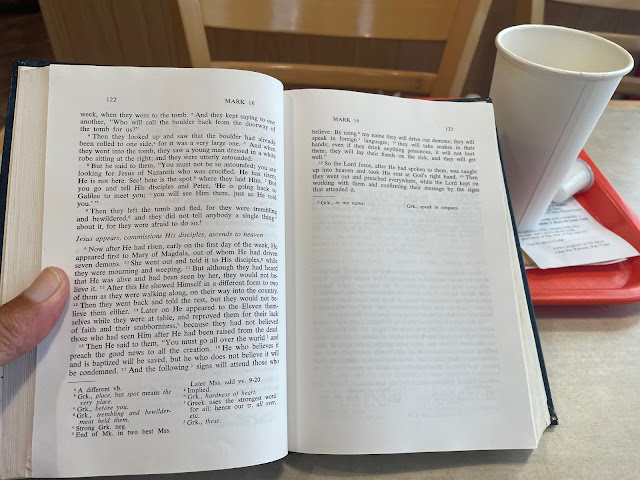Hello again, friends. This morning during my Bible time I chose to use the Williams New Testament as my English Bible.
I wanted to see how he handled the ending of Mark and, interestingly, he includes the last twelve verses of Mark without even a footnote. I say "interestingly" because he does leave out completely John 7:53-8:11, familiarly known as the "woman taken in adultery" passage. (More on that title in another blog post.)
I enjoy reading Williams because he often comes up with translations that differ from mainstream English Bible versions. I found one such difference in Mark 16:15, which is Mark's version of Jesus' "Great Commission." Williams renders this verse as follows:
Then He said to them, "You must go all over the world and preach the good news to all the creation."
Notice how Williams emphasizes the idea of preaching the Gospel "all over the world." In a footnote he writes, "Greek uses the strongest word for all; hence our tr. all over, etc."
I had never seen this in the Greek of Mark 16:15 before and I think he's spot on. My mind immediately went to a parallel passage in Mark 14. This is the passage where a woman anoints Jesus with costly perfume. In verse 9, Jesus says (according to the Williams translation), "I solemnly say to you, all over the world wherever this good news is proclaimed, the deed that she has done will also be told, in memory of her."
The idea both here and in Mark 16:15 seems be something like "each and every part of the world." That emphasis seems to be lacking in those versions that simply translate the Greek as "the whole world."
As always, God's holy word provides his people with divine insight into how we are to go about our lives. Much to my delight, we now have a whole generation of young people who are discovering the joy of digging into the word for themselves. One of the reasons I teach Greek is to help them along in this exciting progress of discovery.
By the way, if you're wondering why I even bother to discuss a text that the great majority of scholars have concluded is not a part of the original text of Scripture, I will link to a couple of books below that explain my views on the authenticity of Mark 16:9-20. Suffice it to say here that over 99 percent of extant Greek manuscripts include these verses. So please be cautious if your English version has a footnote saying something like, "Some of the earliest manuscripts do not include 16:9-20." "Some" actually means only two of the "earliest" manuscripts. (A much later medieval Greek manuscript also omits the passage.) I will not be surprised if this passage comes up for discussion during the Clearview Apologetics Conference later this month. In the meantime, if you'd like to see how yours truly handles this debate, here are two resources you might want to check out:
Perspectives on the Ending of Mark.
Why Four Gospels? The Historical Origins of the Gospels.
As always, thanks so much for reading.


